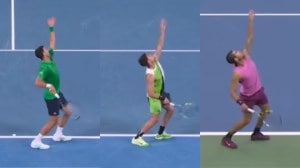Saving the CTBT
The endeavour to halt the development of new nuclear weapons in the world has been seriously hit by the US Senate's rejection of the Comp...

The endeavour to halt the development of new nuclear weapons in the world has been seriously hit by the US Senate8217;s rejection of the Comprehensive Test Ban Treaty CTBT. Over 150 nations have signed it and 26 of the 44 required to ratify it have done so. All the states which have tested nuclear weapons barring India and Pakistan are among the signatories but only Britain and France have ratified it. Weapons powers who have signed but not ratified are the three who have conducted the largest number of nuclear tests and possess the largest nuclear arsenals. Of them the US, as of now, has refused to ratify and the other two, Russia and China, have given the excuse they need to hold out. Until the US changes its mind, Moscow and Beijing do not look like rising to the challenge, assuming leadership roles, setting good examples and signing on the dotted line. The treaty could die a slow death unless the rest of the world acts concertedly to keep it alive.
It is ironic how the US has managed to snatch defeat fromthe jaws of victory. With India, the US co-sponsored the UN resolution which lead, after a three-decade wait, to finalisation of the text of an underground test ban treaty at the Conference for Disarmament in Geneva. Washington played a leadership role in campaigning for the treaty, labouring mightily to persuade sceptics that the treaty was verifiable and effective and would make the world a safer place. All the weapons states looked close to adopting the treaty. Even New Delhi and Islamabad were preparing to get on board. The Vajpayee government has asserted it will work to win a domestic consensus on the CTBT and sign if the other weapons states sign. Islamabad until the generals came along was expected to follow India into the treaty. So has Senator Jesse Helms managed to unravel within a week a complex skein of subtle and tacit international understandings going back to 1996?
Paradoxically, the Republicans, hawkish on defence matters, may have enhanced the value of the CTBT in the eyes of those whowere sceptical about its effectiveness. But that perception is of limited use without political commitments to bring the CTBT into force. It is possible but not certain that Washington will become proactive again under a new president. The treaty must be saved without waiting for America to take the lead and the treaty must be saved because there is no better deal on the table for slowing down, if not totally arresting the development of new nuclear weapons and the acquisition of nuclear weapons by more states. The Vajpayee government was preparing to sign the treaty and should not now wait for others to take the initiative. It is essential to come out strongly and unequivocally in favour of the CTBT for several reasons. One: to confirm India8217;s declared defensive stance based on minimum deterrence. Two: to re-establish the credibility of the Pokharan-II tests which the government has said provided all the necessary know-how for future weaponisation. Having already declared a unilateral moratorium on testingIndia can go further. Three: India is committed to universal disarmament and should take the leadership in bringing about a test ban which is one step towards that goal.
- 01
- 02
- 03
- 04
- 05









![Kokrajhar [Assam], Jan 20 (ANI): Police deployed during a protest between two groups at National Highway, in Kokrajhar on Tuesday. (ANI Video Grab)](https://images.indianexpress.com/2026/01/kokrajhar.jpg?w=300)





















